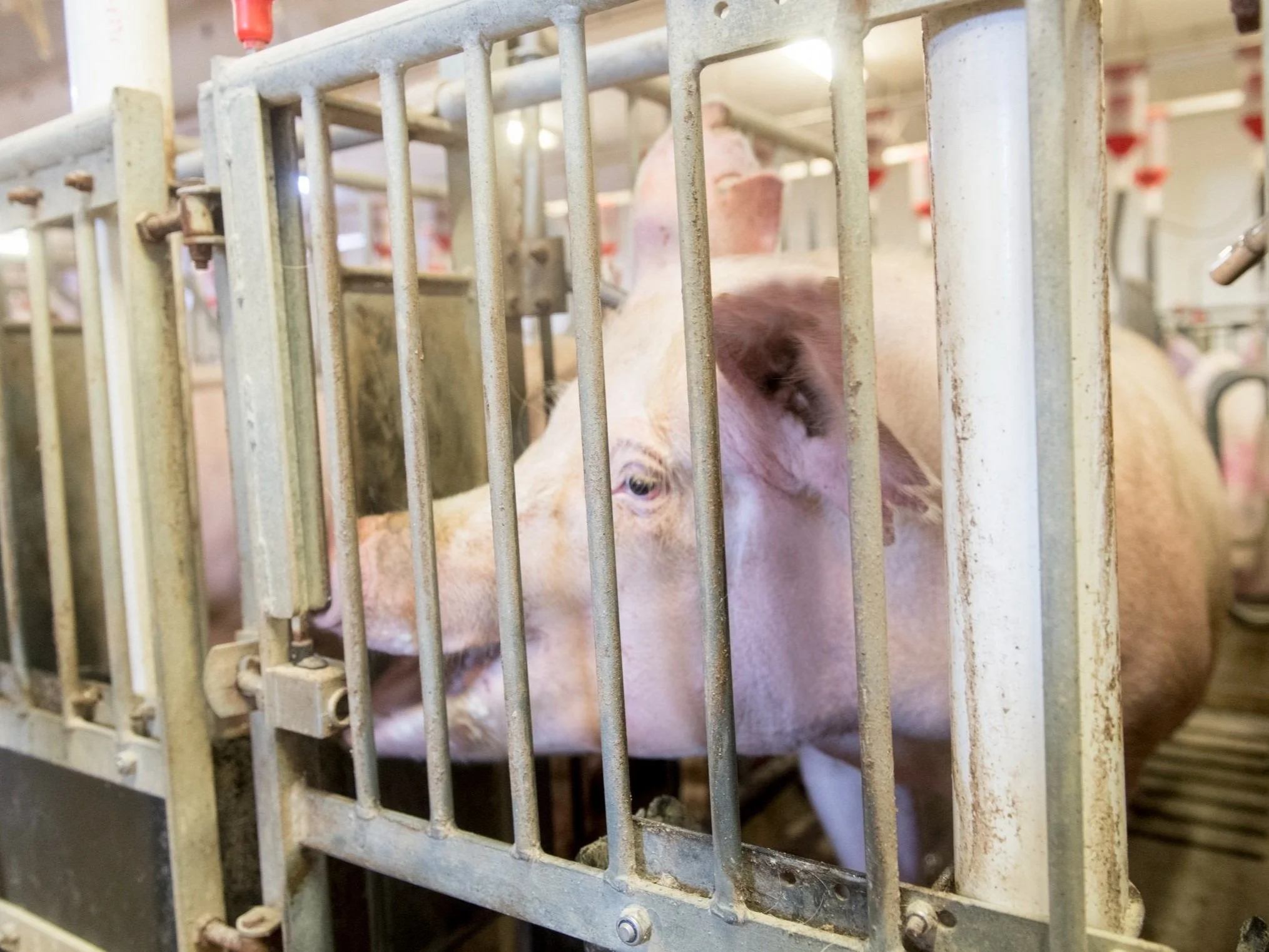New survey shows increased pork productivity and decreased environmental footprint
An analysis of Canadian pork production over the past 30 years shows a continued increase in efficiency and productivity and a shrinking of the sector's environmental footprint. Dr. Mario Tenuta, the Senior Industrial Research Chair in 4R Nutrient Stewardship and a Professor of Soil Ecology with the University of Manitoba, said the study shows from 1990 to 2020 the efficiency of producing pork improved by a good eight to 10 percent.
Farmers and consumers urged to encourage senate support of Bill C-234 to help preserve competitiveness of Canadian agriculture
The General Manager of Sask Pork is suggesting that the passage of Bill C-234 is critical to preserving the ability of Canadian farmers to compete in an international market place. Bill C-234, a private member's bill that will create specific exemptions for farmers to Canada's carbon pricing scheme has passed in the House of Commons and is now awaiting passage in the Senate.
Saskatchewan pork producers applaud passage of Bill C-234 by House of Commons
Sask Pork is applauding the passage of Bill C-234 in the House of Commons and hopes for quick ratification in the Senate. The private member's bill that will create specific exemptions for farmers to Canada's carbon pricing scheme has passed in the House of Commons and will now move to Senate. Mark Ferguson, the General Manager of Sask Pork, said the carbon tax has added an estimated one to three dollars per pig and the impact will only go up.
Moving pigs in hot weather requires added attention, says Olymel's Kevin Brooks
An animal welfare and handling specialist with Olymel suggests moving pigs in small groups and focusing on body position, point of balance and flight zones, especially when the weather gets hot, will making moving pigs less stressful on the pigs and the handlers.
Survey of small-scale pig producers results in improved educational resources
A survey of the needs of small-scale pig producers is leading to the development of improved educational resources for the entire pork sector. Scientists with Prairie Swine Centre, in collaboration with Swine Innovation Porc, the Canadian Pork Council and the provincial pork organizations, including Sask Pork, conducted a study of small-scale swine producers on their knowledge and application of biosecurity practices to prevent disease.
Long-time Saskatchewan hog farmer says U.S. Supreme Court ruling expected to pressure all North American pork producers
Last week's U.S. Supreme Court ruling on California’s Proposition 12 is expected to result in higher pork prices in that state while placing added financial pressure on pork producers throughout North America. Florian Possberg, a partner with Polar Pork Farms, said that California accounts for about 15 to 20 percent of U.S. pork consumption and California tends to set the standard for other states in terms of animal welfare.
CWSHIN unveils new five-year strategic plan, emphasizing swine health threats close to home
The Manager of the Canada West Swine Health Intelligence Network (CWSHIN) says its new five-year strategic plan will place a greater emphasis on diseases that are causing challenges closer to home. CWSHIN is putting the finishing touches on a new strategic plan that will guide activities over the next five years, until the end of March 2028.
New swine research cluster expected to focus on pork sector sustainability, competitiveness, productivity, and resilience
The General Manager of Swine Innovation Porc says the pork sector's planned next swine cluster research program will focus on pork sector sustainability, competitiveness, productivity and resiliency. Swine Innovation Porc, the national organization for research in the pork sector, submitted its application to Agriculture and Agri-Food Canada in January for funding for 19 projects being proposed under Swine Cluster-4.
Saskatchewan-connected research on hair analysis finds new way to test stress in pigs
An international research effort, with ties to Saskatchewan, is looking at the potential of measuring hormone levels in the hair of pigs to identify genetic lines that will be less affected by stress. Researchers with Iowa State University, the University of Saskatchewan, the University of Alberta and CDPQ are collaborating on a project under which the levels of three stress hormones in the hair of pigs are being measured to evaluate the effect of stress on performance and on disease resilience.
Researchers work to replace antibiotics with probiotics in nursery pigs
A multi-institutional team of scientists is conducting research aimed at replacing antibiotics with probiotic bacteria to combat diarrhea in nursery pigs. In response to public concerns over antibiotic use in livestock production and the potential for antibiotic resistance, scientists with Agriculture and Agri-Food Canada, the University of Saskatchewan, University of Manitoba, and the University of Guelph, with funding from Swine Innovation Porc, are working to develop viable alternatives to antibiotics in nursery pigs.
Early detection and treatment of disease increases prospects of survival, says Sask Pork webinar guest
The CEO of Signature Swine Solutions says the quicker a pig is identified as sick and is treated, the less discomfort it will endure and the greater chance it will have at recovery. Sask Pork hosted the first in a series of three spring webinars yesterday, "Practical Pig Handling and Animal Care: Tips & Tricks." Mara Rozitis, the CEO of Signature Swine Solutions, told attendees that pigs will hide their disability so they are often quite far down the path of illness before they are identified as sick and receive treatment.
New cull sow slaughter plant promises multiple benefits, says Sask producer
A partner with Polar Pork Farms says a new Saskatchewan based cull sow slaughtering plant will reduce the cost of shipping sows to slaughter, minimize the risk of transmitting disease from one country to the other and avoid the complications that result from border closures.
High feed costs continue to erode pork sector profitability, says Saskatchewan producer
A partner with Polar Pork Farms says the conflict in Ukraine continues to influence feed grain prices contributing to reduced profitability for pork producers and higher food costs for consumers.
Dependence on exports makes preparing for foreign animal disease critical says Sask Pork GM
The General Manager of Sask Pork is suggesting the Canadian pork sector's dependence on exports makes the prevention and preparation for foreign animal disease critical.
Sask Pork Whole Hog youth ambassador outlines importance of public awareness for pork production
Sask Pork's Whole Hog Youth Ambassador says it's important for people to be more aware of where their food comes from and lots of other products too. Sask Pork’s just-launched The Whole Hog Youth Ambassador Program is a new agricultural education program designed to help share the story of pork production in spite of the biosecurity protocols that make communicating with consumers such a challenge.
Simple strategies can help reduce negative effects of stress for hog farmers
The creator of High Heels and Canola Fields says simple strategies can make a big difference when it comes to dealing with the everyday stresses that occur on the farm. "When Stress is More Than a Season" was the keynote address last month at the 45th annual Saskatchewan Pork Industry Symposium. Lesley Kelly, the creator of High Heels and Canola Fields, a mental wellness website, and a co-founder of Do More Ag, noted mental stress can result in physical symptoms but the signs will vary from person to person.
Farm Health Guardian provides update on progress with Saskatchewan pilot project
A study underway in Saskatchewan will provide pork producers in Saskatchewan a clearer idea of which swine transport vehicle movement tracking technology works best on their farms. Guelph-based Farm Health Guardian and Sask Pork are collaborating on a pilot project to assess the performance of technologies designed to track swine transport vehicle movements.
WCVM SMART program expected to increase number of swine vets in Canada
A new initiative being developed by the Western College of Veterinary Medicine will help address the shortage of swine veterinarians across Canada. In response to the shortage, particularly in swine, the Western College of Veterinary Medicine is launching a new swine medicine advancement, recruitment and training, or SMART program.
Pork Producers Advised to Create, Implement and Adhere to a Farm Safety Plan
The Strategic Advisor Agriculture with Workplace Safety and Prevention Services says the key to maintaining a safe agricultural workplace is to have a plan and to make sure everyone believes in that plan and follows it. Dean Anderson told attendees at the Saskatchewan Pork Industry Symposium 2022, the sectors that face the greatest risks tend to be those that have the largest equipment without a formal health and safety program, including agriculture.




















